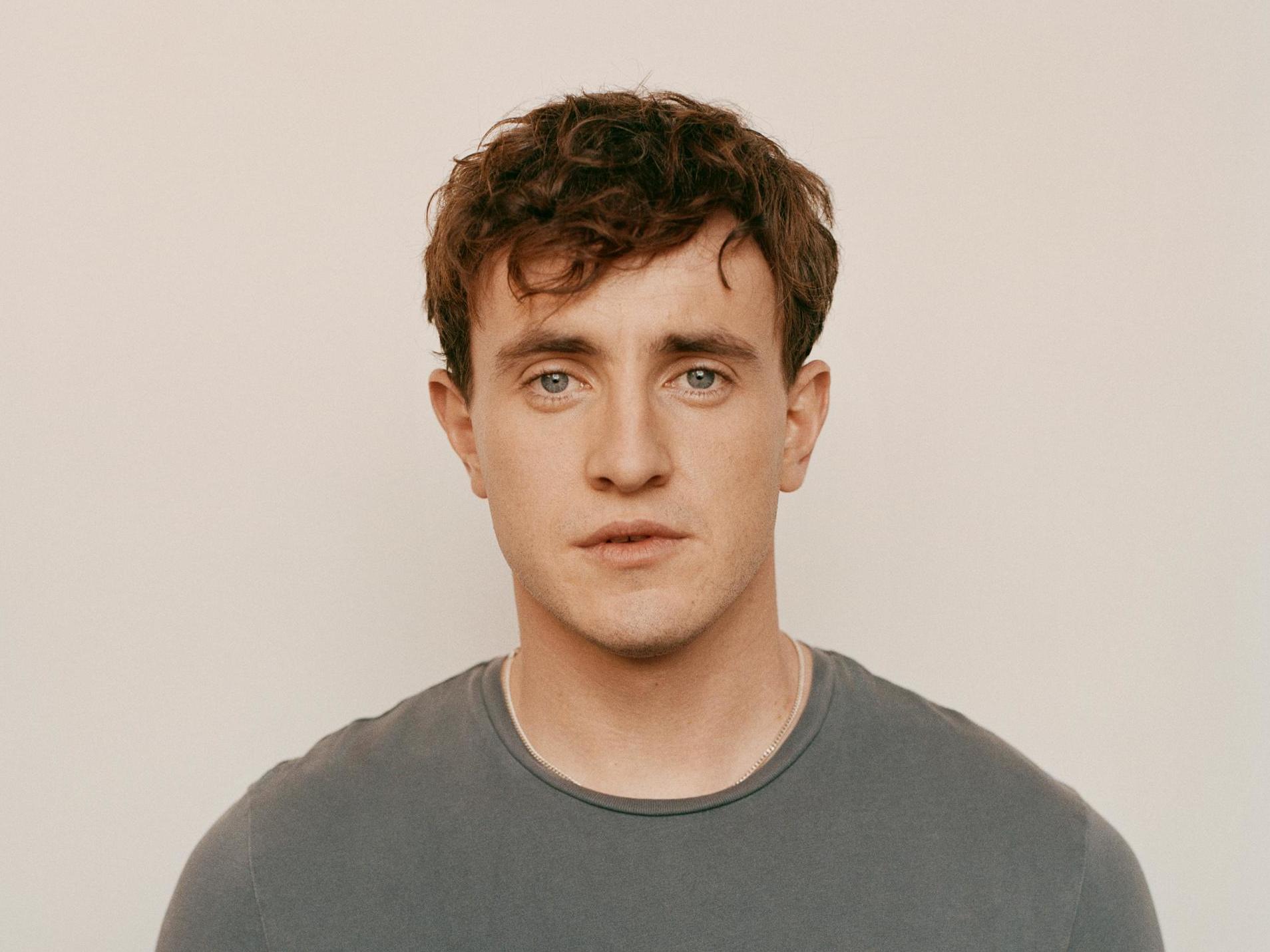Normal People’s Paul Mescal: ‘I was really nervous portraying Connell’s depression – there were three suicides at my school’
The actor bringing Sally Rooney’s smash-hit novel to life talks to Ellie Harrison about experiencing tragedy at a young age, how Normal People’s depiction of sex is the antidote to porn and Hollywood, and what it’s like to promote the biggest role of his life in lockdown


My innocence was ripped away very quickly,” says Paul Mescal, remembering the suicide of his classmate at secondary school. “You think you’re a big boy at 14 but you’re not. You’re still a child.”
The 24-year-old actor, who grew up in County Kildare near Dublin, is discussing how his experience of Ireland’s mental illness epidemic echoed his role in Normal People, the BBC’s sublime adaptation of Sally Rooney’s coming-of-age novel. Mescal’s character, Connell, spirals into a severe depression after a childhood friend takes his own life and his body is found in a river.
“Three people killed themselves at my school,” says Mescal. “So it’s not fictional to me, it’s real, and I was really nervous portraying it.” After the first death, Mescal’s mother took him out of lessons for a week because he “wasn’t equipped to cope with that level of devastation”.
“I wasn’t particularly close to the person, but that kind of sadness permeates through an entire year group,” he says. “The distinct feeling I remember having at the time is that I didn’t know how to perform sadness in the way I saw other people around me being sad. I was nervous people didn’t think I was sad enough. I found the whole thing incredibly confusing and, in hindsight, formative.”
Rooney was just 26 when she wrote Normal People, which has sold almost 500,000 copies in the UK and seen her hailed as the “first great millennial novelist”. It follows Connell and Marianne, two teenagers from either side of the class divide, who fall in love. At their school in Sligo, Connell is a popular but sensitive sports jock, while Marianne is a bright and enigmatic loner. Despite their surface-level differences, they have a profound intellectual and sexual connection that pulls them hopelessly back towards each other no matter how many times they break apart.
It is no overstatement to say that Mescal and his co-star Daisy Edgar-Jones are playing two of the most coveted TV roles for people of their generation. What a relief, then, that they inhabit the characters so naturally that it feels as if Rooney somehow had them in mind as she wrote. Edgar-Jones deftly balances Marianne’s mix of spikiness and vulnerability, while Mescal plays Connell with hair-raising intensity, his face a picture of confused adoration.
Mescal is promoting the biggest role of his life from his home in east London, where he is spending lockdown alone. He describes isolation as a “breeding ground for anxiety” but clearly has a sense of humour about Normal People having a captive audience. “You can’t get away from it, unfortunately,” he says over Zoom. “It’s very strange, I’m getting excited for a show that’s coming out and I’ll be watching it by myself at home.” He laughs. “Sometimes I go to the mirror so it feels like I’m talking to somebody.”

While Mescal was raised by both his mother and father – a policewoman and a teacher – Connell was brought up by a single parent, the pair nevertheless have a lot in common. Like Connell, Mescal spent his schooldays playing Gaelic football. He was a polite child – “not bold” – and came from a “loving home”.
Normal People struck a chord with so many readers because it encapsulated how intoxicating first love is, and this resonated deeply with Mescal. “I had a very intense relationship at the end of secondary school,” he says. “Connell wants to absorb Marianne. He knows where she is sitting in a room without even having to look. I remember that feeling in my body when I was sitting in class and my brain was constantly in tune with this other person. And although I wasn’t hiding the relationship like Connell does, I remember worrying, ‘What would my friends think if we held hands in the corridor?’”

Watch Apple TV+ free for 7 day
New subscribers only. £9.99/mo. after free trial. Plan auto-renews until cancelled.
ADVERTISEMENT. If you sign up to this service we will earn commission. This revenue helps to fund journalism across The Independent.

Watch Apple TV+ free for 7 day
New subscribers only. £9.99/mo. after free trial. Plan auto-renews until cancelled.
ADVERTISEMENT. If you sign up to this service we will earn commission. This revenue helps to fund journalism across The Independent.
After leaving school, Marianne and Connell cross paths again at Trinity College Dublin, where their roles have reversed. She is the assured beauty everyone wants to talk to at parties, while he is the uncertain misfit. Mescal experienced how cliquey and competitive Ireland’s most prestigious university is first-hand when he studied drama there. “At Trinity, everyone is performing,” he says. “It’s a college for people who are excellent in their fields of study, so everyone was trying to one-up each other, to appear to be better read or on the cutting edge of fashion. I found it very difficult to siphon through what was the real version of someone versus what they were projecting.”
For all their similarities, Mescal notes an important distinction between himself and Connell. “Being an actor and coming from a house where I was permitted to talk about my feelings, I’m able to discuss them quite quickly,” he says. “Connell thinks about his feelings a lot but doesn’t express them and that cripples him. I found him really claustrophobic to play. I wanted to rip open his heart and tell him, ‘Just say what you’re thinking for five minutes and I promise you’ll feel a bit better.’”

Claustrophobia hangs heavy over both the novel and its TV adaptation. The sex scenes, especially, are filmed with crushing intimacy. They’re awkward and tentative and a refreshing antidote to the glossy scenes in blockbuster movies that set unattainable standards, with their candle-lit settings and easy orgasms. Mescal believes Hollywood has “played a massive role” in making sex so taboo in our society. “It portrays sex in a way that isn’t true to life,” he says. “They have to hold their hands up and say they haven’t helped with that. I also grew up in a time when porn has been a massive educator in terms of how people see sex. It can be a really tricky transition from watching scenes like that to encountering sex in your own life for the first time. That’s why I was so excited when I read the Normal People script.”
Normal People has repeatedly been dubbed a “millennial love story”, a description Mescal dismisses as “basic” and “reductive”. “I guess it’s to do with fitting words into a small space to describe a novel, fair enough, but that’s not my relationship with it,” he says. “To be brutally honest, most people I know are meeting over apps. That’s not the case with Connell and Marianne. There’s something extraordinary about them and I don’t think they can be labelled as millennial.” He smiles, knowingly. “They’re way more interesting than a title like that.”
Read the rest of our Rising Stars interviews here.
Join our commenting forum
Join thought-provoking conversations, follow other Independent readers and see their replies
Comments
Bookmark popover
Removed from bookmarks